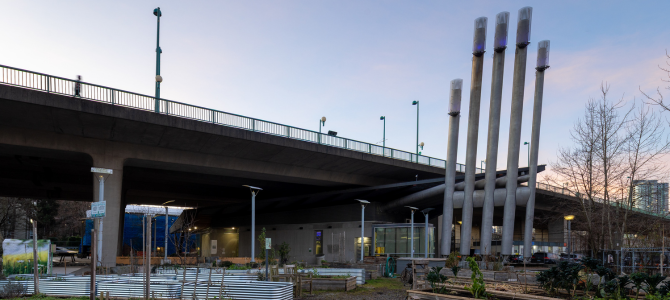
 City completes energy centre expansion delivering low carbon heating to more homes and businesses in False Creek, Mount Pleasant
City completes energy centre expansion delivering low carbon heating to more homes and businesses in False Creek, Mount Pleasant
The False Creek Neighbourhood Energy Utility (NEU) has completed a major expansion of its innovative sewage heat recovery system. This expansion supports the growing NEU network which supplies low carbon heating to 47 buildings, representing over 10,000 residents, Emily Carr University, Creekside Community Centre and several local businesses.
The NEU provides a centralized heating source for people living in Southeast False Creek, parts of Mount Pleasant and False Creek Flats. Instead of individual buildings using traditional heating systems such as furnaces or boilers, they are connected to the NEU, which features sewage-to-water heat pumps that provide low carbon heating generated primarily from waste sewage heat.
The new sewage-to-water heat pumps produce hot water at efficiencies of over three hundred percent ensuring buildings stay warm, even on the coldest days of the year.
"The False Creek Neighbourhood Energy Utility (NEU) is a great example of Vancouver’s ingenuity – we’ve literally turned raw sewage into an energy resource for the community,” said Mayor Ken Sim. “Energy that would have been wasted down the drain is now heating commercial and residential spaces in parts of our most densely populated neighbourhoods.”
The expansion introduced two new sewage-to-water heat pumps, adding 3.3 megawatts of heating capacity each, tripling the NEU’s sewage heat recovery capacity. The heat pumps deliver more than three units of thermal energy for every unit of electricity used, requiring less reliance on BC Hydro’s Integrated Power Grid. During the expansion, upgrades were also made to the NEU’s control systems while adding new sewage screening equipment, all of which will support a reliable and resilient energy supply.
“The False Creek Neighbourhood Energy Utility is a smart, sustainable solution that demonstrates how cities can take meaningful action to reduce greenhouse gas emissions,” said the Honourable Hedy Fry, Member of Parliament for Vancouver Centre. “By capturing waste heat from sewage, Vancouver is showing leadership in building resilient, climate-conscious communities that are shaping a cleaner, greener future.”
“Real climate progress happens when we work together on solutions that last,” said Adrian Dix, Minister of Energy and Climate Solutions. “Vancouver’s system is a great example of how innovation and partnership can turn everyday waste into clean energy that benefits people and the planet.”
The total cost of the project is approximately $20 million. The project received $10.2 million through the CleanBC Communities Fund External website, opens in new tab, with $4.6 million coming from the Province of British Columbia and $5.6 million from the Government of Canada. The CleanBC Communities Fund is jointly funded by the provincial and federal government and supports infrastructure projects that improve renewable energy capacity, clean transportation, building efficiency, and clean energy generation.
In addition, the project received $8.3 million in financing along with a grant of $1.2 million from the Government of Canada through the Federation of Canadian Municipalities’ Green Municipal Fund (GMF) External website, opens in new tab.
About the Neighbourhood Energy Utility (NEU)
The City of Vancouver’s NEU was the first district energy centre in North America to utilize sewage heat as an energy resource. By providing low carbon heating to buildings, the NEU is helping to reduce greenhouse gas emissions by 7,000 tonnes per year. Burning natural gas, a fossil fuel, in buildings accounts for nearly 60% of the carbon pollution generated in Vancouver. This City-owned and operated utility is self-funded, providing both a return on investment and cost-effective rates to customers.